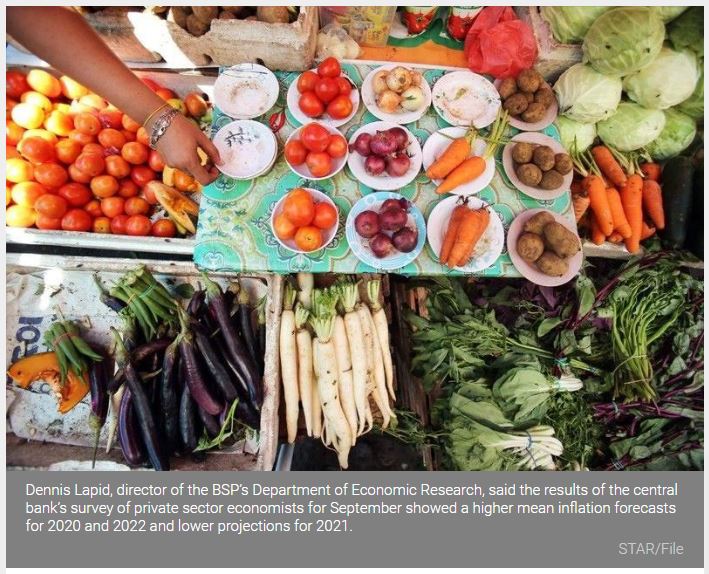Philippines: Economists raise inflation forecasts
MANILA, Philippines — Economists of private banks have raised their inflation forecasts for 2020 as recovery starts following the government’s decision to gradually reopen the economy, according to the Bangko Sentral ng Pilipinas (BSP).
Dennis Lapid, director of the BSP’s Department of Economic Research (DER), said the results of the central bank’s survey of private sector economists for September showed a higher mean inflation forecasts for 2020 and 2022 and lower projections for 2021.
Lapid said private economists now expect inflation to average 2.5 percent this year and three percent next year.
He also said that analysts expect inflation to remain at the lower end of the BSP’s two to four percent target range in 2020, with broadly balanced risks to the inflation outlook.
Aside from a rebound in domestic demand with the gradual reopening of the economy, Lapid explained other key upside risks to inflation cited by economists include higher transport prices, the supply chain disruptions due to the quarantine measures, higher prices of basic and essential items such as food, as well as higher headline inflation brought about by the additional liquidity from the series of policy easing done by the BSP.
On the other hand, Lapid said downside risks to inflation are seen to emanate from subdued domestic demand due to prolonged lockdown restrictions, lower consumer spending, and high unemployment resulting from the closure of businesses, as well as downside pressures on global crude oil prices.
Lapid also cited the oversupply of discretionary goods as consumer demand was limited to essential goods.
Based on the probability distribution of the forecasts provided by 20 out of 24 respondents, there is a 90.9 percent probability that average inflation for 2020 would hover within the two to four percent range.
Al-Amanah Islamic Bank expects inflation this year to average 2.8 percent followed by East West Bank with 2.7 percent, Metrobank and UBS with 2.6 percent, Maybank with 2.55 percent, and BDO with 2.53 percent. Bank of China has the lowest inflation projection for this year at two percent.
For 2022, Security Bank and Al-Amanah Islamic Bank have the highest inflation forecast of 3.5 percent followed by CTVC Bank and Metrobank with a range of 2.5 to 3.5 percent, RCBC with a range of 2.9 to 3.4 percent, and Nomura with 3.3 percent.
On the other hand, Lapid said private economists lowered their inflation forecasts for 2021 to 2.8 instead of 2.9 percent. CTBC has the highest inflation forecast with a range of 2.5 to 3.5 percent followed by Maybank at 3.2, Philippine Equity Partners at 3.1 percent.
Inflation averaged 2.5 percent from January to September after easing for the third straight month to a four-month low of 2.3 percent in September. The Monetary Board lowered its inflation forecasts to 2.3 percent this year, 2.8 percent in 2021, and three percent for 2022.
BSP Governor Benjamin Diokno earlier said monetary authorities were able to maintain its accommodative stance largely because of the ample policy room afforded by a benign inflation environment and well-anchored inflation expectations.
Diokno said the overall balance of risks to the BSP’s inflation outlook also remains tilted to the downside for 2020 through 2022, as uncertainty surrounding the pandemic continues to dampen demand and prospects for a strong and immediate recovery.
“Amid a benign inflation environment and stable domestic liquidity conditions, the BSP found it appropriate to take a prudent pause from monetary easing and allow prior actions to continue to work their way through the economy,” Diokno said.
Source: https://www.philstar.com/business/2020/11/02/2053919/economists-raise-inflation-forecasts


 English
English




